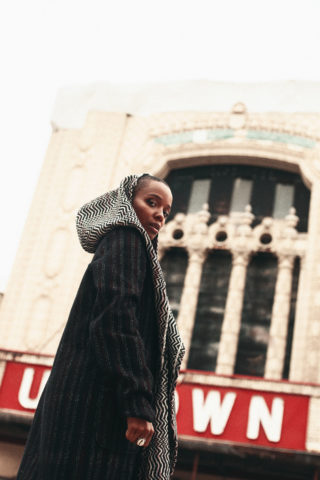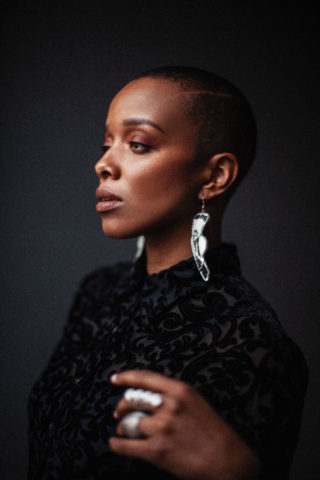Jamila Woods – The Chicago artist in her own words
On being inspired by evolving black youth culture, authenticity and maxing out her phone storage with new ideas

On being inspired by evolving black youth culture, authenticity and maxing out her phone storage with new ideas
As a vocalist, poet and songwriter, Jamila Woods could easily fit into the “millennial multi-hyphenate” category. However, she’s a world apart from the inexperienced figure (i.e. the dilettante dabbling in podcasts) that such a term might conjure up. Rather, she’s a serious, considered artist who has cultivated her skills through years of creative practice.
Not only are Woods’ talents broad and varied, but she’s generous about sharing them: alongside work as an activist, she’s also involved teaching high schoolers the poetic craft in a role as Associate Artistic Director of Young Chicago Authors.
In 2016, the melodic singing and fresh neo-soul showcased on Woods’ solo album, HEAVN, proved irresistible. Now, she’s back with the excellent LEGACY! LEGACY!, a powerful exploration of Black Excellence and identity through songs profiling the legacies of figures such as blues musician Muddy Waters, science fiction writer Octavia Butler and visual artist Jean-Michel Basquiat. The week of LEGACY! LEGACY!’s release, Woods spoke with me about community work, legacy and authenticity over a transatlantic phone call.
“It was always natural for me to want to impact a younger generation”
Chicago has a lot of community spaces so I came up in different artistic programmes that I think helped shape me as an artist. I did a lot of poetry in high school and that definitely impacted the way I write music. [My involvement with Young Chicago Authors] just felt very natural because that’s the way that I was taught. When I was in high school I was in a project called Gallery 37 and it was really cool to be in a learning space outside of school. My school environment was very rigid and there were a lot of rules but not a lot of seeing myself reflected in what I was learning. But the poetry programme was taught by young artists of colour and I could see myself in them.
“I’m constantly inspired by black people, especially black youth culture”
Black people are constantly evolving and creating new meaning and new, different words to describe things. It’s very seamless, effortless poetry that’s being created. Especially with me getting to work with young people a lot, it’s really cool to witness that and it’s constantly inspiring to me. Young people are underestimated across the board, across the world, particularly young people of colour, so I really get inspiration from their resilience.
“Poetry gave me more confidence in my voice as a solo singer”
My mom played music growing up and I was in my grandma’s church choir, and then later the Chicago Children’s Choir, so I always loved music and singing. But when I got to poetry in high school it changed my perspective on what I could do as a singer. Before that I was always in choirs and didn’t think I had the voice to be a solo singer. Through poetry I started writing for my voice, and having a message or a story I wanted to tell. The way that I approach songwriting now is definitely influenced by my work as a poet. I teach poetry to high school students and so a lot of times when I’m writing I’ll give myself prompts or apply the things I do with my students to myself in order to prompt me to write. I use a lot of sampling and allusion that happen a lot in poetry, and a lot of the references that I use in my poetry I also use in my songwriting.

“Making LEGACY! LEGACY! was a pretty organic process”
Before I realised I was writing a new album I was just trying to write new songs. I was giving myself different prompts, so at first I gave myself the prompt to cover one of Nikki Giovanni’s poems, ‘Ego Tripping’, and that became the first song, ‘Giovanni’. Then one of my friends asked me to cover his poem about Muddy Waters and I did a lot of research on Muddy Waters and wrote a song called ‘Muddy’. So then it was just me making a list of other writers, visual artists and musicians who have impacted me. I didn’t end up making a song for each person on the list. It was really just once I got into reading about and watching a lot of interviews with these people who appealed to me in the moment, it was kind of just like what songs were able to come and I didn’t force the ones that weren’t able to come. I watched a lot of interviews looking at how these artists were able to express themselves and talk about their work and their personal lives in the interview setting – that was really inspiring to me. I worked really closely with the producer Slot-A and it was really cool to try to create instrumentals that reflected the work of the people as well.
“My phone storage is constantly full because I have so many notes”
I love to have a lot of material to pull from. Usually I keep a notebook and if I have a thought I’ll just write it down. When I’m looking through journals or reading and I see a quote, I’ll write it down. When I’m writing I usually like to work with a producer and listen to some of the sounds that they’re making and then I’ll look through all my notes or look through my journal to try to get an initial spark of an idea that will help me start. At home I have a bunch of poetry books and visual art books that I look through sometimes. It’s a process of collecting that I’m doing constantly. Then when I sit down to write it’s like I’ve already been playing with various ideas, whether it’s in my journal or in the notes on my phone, so the ideas are ready to cook at that point.
“The most important thing is the freedom to be as uniquely yourself as possible”
I feel like it’s important for artists to feel like they can be authentic in themselves and I think that’s what’s cool about creating in a moment where there’s more opportunity for independent artists to not feel like they need to compromise about their image or what they want to say or how they want their music to sound. So I think the most important thing, especially for artists from marginalised communities like artists of colour or queer artists, is for there to be as much authentic representation as possible. Otherwise you’re just getting manufactured stereotypes and limiting the representation of what a black artist is or what a queer artist is.
“I think I’m still discovering what my legacy is; I’m still living”
I like one of the quotes from Miles Davis, he says something like: “don’t call me legend until I kick the bucket.” I can’t remember his original quote but I like this idea of having the permission to evolve and discover who I am. I think this whole project has been really inspiring to look into the legacies of what other artists have left and how they’ve influenced me. I feel that it’s more important to not limit myself and to try to be authentically myself.
Photos by: Bradley Murray